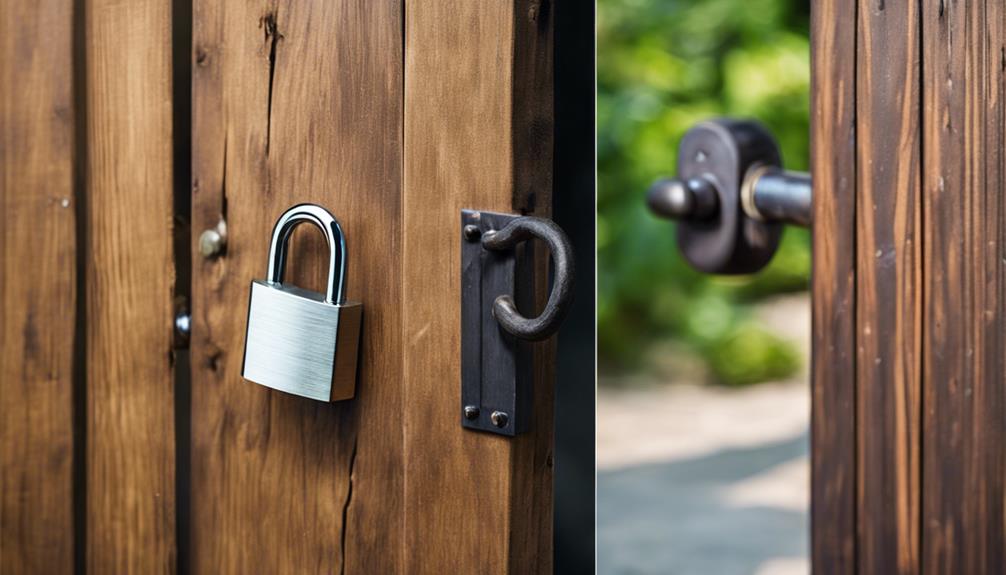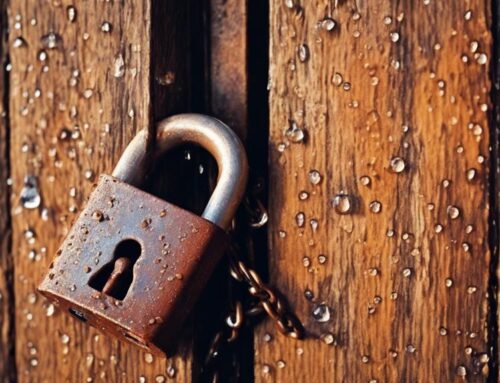When you're comparing padlocks and keyless locks, it really comes down to your specific needs. Padlocks offer reliability and ease of use, especially for outdoor storage or temporary locking situations. They're straightforward, don't require batteries, and are versatile. In contrast, keyless locks provide modern convenience with features like remote access, temporary codes, and no need for physical keys. However, they do require regular maintenance and battery checks. Each option has its benefits, so the best choice depends on your security requirements and lifestyle. To find out which lock might suit you best, you might want to explore more options.
Key Takeaways
- Padlocks are simple and reliable, ideal for outdoor storage and temporary locking needs without the need for batteries or complex technology.
- Keyless locks offer convenience with features like remote access and customizable codes, streamlining entry for multiple users and enhancing access management.
- Security-wise, keyless locks provide advanced options like biometric authentication and audit trails, while high-security padlocks may be vulnerable to picking.
- Installation for keyless locks requires basic tools and regular battery checks, whereas padlocks need minimal maintenance and no installation.
- The choice between padlocks and keyless locks depends on specific security needs, convenience preferences, and the intended use case.
Overview of Padlocks
Padlocks are among the most common and versatile locking mechanisms available today. They offer a reliable way to secure personal belongings, properties, and even community resources. Whether you're looking to protect a storage unit, a shed, or a bicycle, padlocks can meet a variety of padlock applications.
Their simplicity makes them user-friendly, allowing you to easily lock or open your valuables without needing complicated technology. Additionally, re-keying options are available for some padlocks, providing an enhanced level of security without needing to replace the entire lock system. This feature can be especially useful for maintaining control over access to shared spaces or when needing to change security codes frequently, as discussed in re-keying locks.
When considering padlocks, it's crucial to think about padlock durability. High-quality materials, like hardened steel, can withstand weather elements and physical attacks, ensuring long-lasting protection. Investing in a durable padlock gives you peace of mind, knowing your belongings are safe.
Different padlock types exist, each suited for specific applications, from combination locks to keyed options. You can select one based on your security needs and your preference for ease of use.
In serving others, you might choose padlocks to enhance community safety or provide reassurance to those around you. Understanding the range of padlock applications can help you select the right tools to protect what matters most in your life and the lives of those you care about.
Overview of Keyless Locks
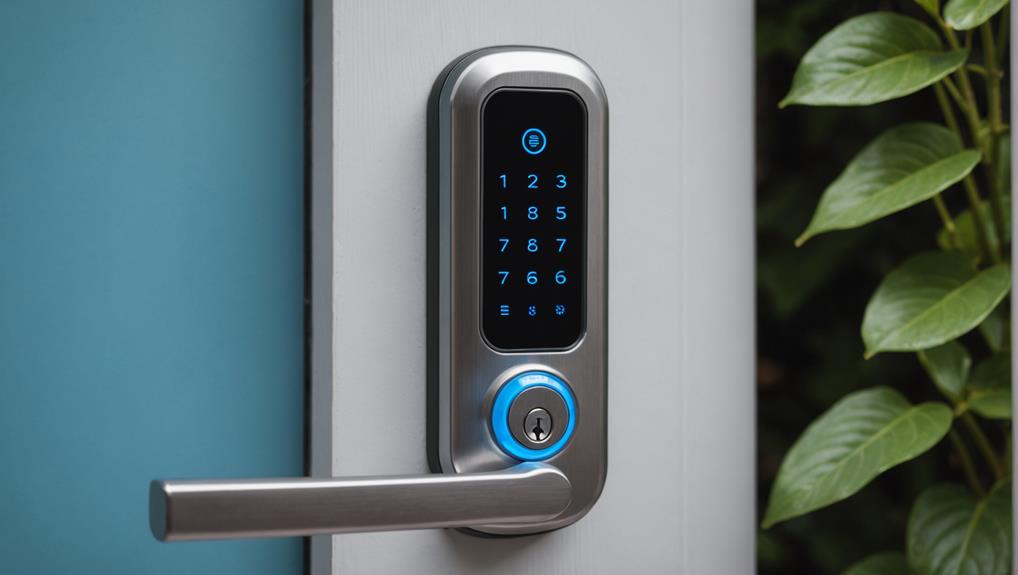
Keyless locks come in various types, each offering unique features to enhance security.
Many smart locks, for example, provide advanced options like remote access and activity monitoring, which can greatly improve your home's security profile smart locks benefits.
You'll want to compare their security features and understand what suits your needs best.
Plus, considering the installation and maintenance aspects can help you make an informed choice.
Types of Keyless Locks
When it comes to securing your belongings, understanding the various types of keyless locks can make a significant difference. Keyless locks offer a range of options that cater to different needs and preferences.
One popular type is the keypad lock, where you enter a code to gain access. This option is great for homes and businesses, allowing you to share codes with trusted individuals without the hassle of physical keys.
Another option is digital padlocks, which often use Bluetooth technology to open with your smartphone. This modern solution not only simplifies access but also enhances convenience. You can grant or revoke access remotely, making it ideal for shared storage facilities or rental properties.
Smart locks are another variant, integrating with home automation systems, allowing you to control access from anywhere. They often come with features like temporary access codes for guests, boosting keyless lock security.
Lastly, you've got biometric locks that utilize fingerprints for entry, providing a personalized and secure experience.
Each type of keyless lock has its unique benefits, helping you choose the best solution to serve your needs while ensuring your belongings remain secure.
Security Features Compared
Often, the security features of keyless locks make them an attractive option for those looking to enhance their safety measures. Unlike traditional padlocks, keyless locks offer a range of advanced technologies that can provide peace of mind. For instance, many keyless locks utilize biometric authentication, allowing you to open doors with just a fingerprint. This eliminates the risk of losing keys and enhances overall convenience.
When comparing padlock vs keyless lock, it's crucial to evaluate how each performs in various situations. High-security padlocks do offer robust protection, but they can be vulnerable to picking or cutting. Keyless locks often come with features like auto-locking and customizable access codes, which can be particularly beneficial for families or businesses that need to grant temporary access to guests or service providers.
In terms of keyless lock convenience, you can quickly change access codes without the need for a physical key. This flexibility not only enhances security but also simplifies management for those who desire a safe environment for themselves and their loved ones.
Installation and Maintenance
Installing and maintaining keyless locks can be a straightforward process, especially with the right tools and guidance. First, verify you have the necessary tools, like a screwdriver and a level, to make the installation easier. Follow the manufacturer's instructions closely to guarantee a secure fit. If you've used the best padlocks before, you'll appreciate how keyless locks offer similar reliability without the hassle of carrying keys.
Once installed, maintenance is usually minimal. Regularly check the batteries, as most keyless locks rely on them for power. It's a good idea to replace batteries every year or when you notice a decline in performance. Keep the lock clean and free from debris to facilitate smooth operation.
If you ever face issues, many keyless locks come with troubleshooting guides to help you resolve problems quickly.
For those who serve others, consider educating them about the benefits of keyless locks, especially in high-traffic areas where convenience matters. With a little attention, you can guarantee that your keyless locks remain secure and efficient, providing peace of mind for you and those you serve.
Security Features Compared
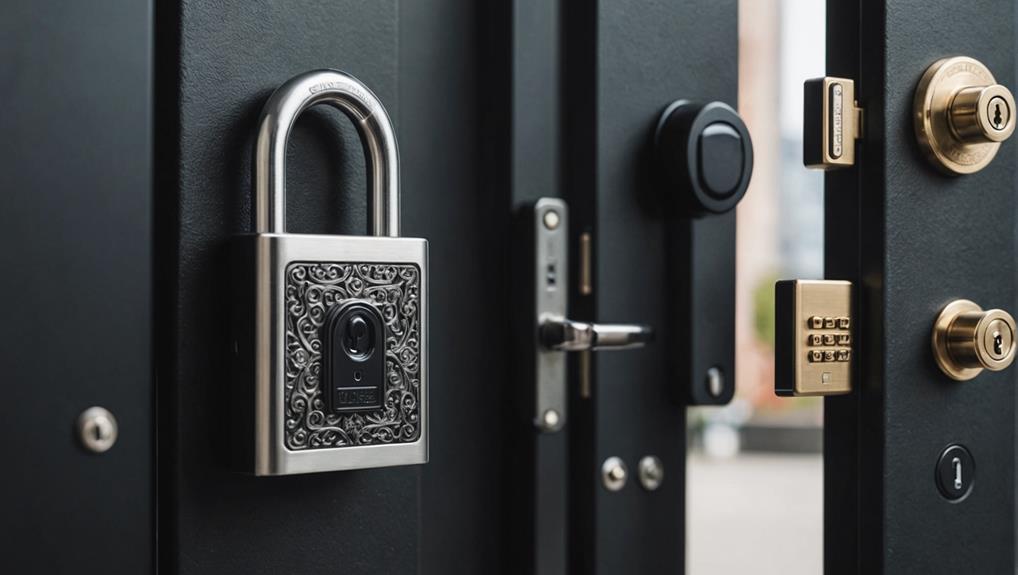
Security features of padlocks and keyless locks vary greatly, impacting your choice based on specific needs. When protecting your loved ones and valuables, understanding these differences is essential.
High-security locks offer enhanced protection through features such as advanced key control and resistance to various forms of tampering, making them a superior option compared to standard locks.
Here's a comparison of key security features you should consider:
- Physical Strength: Padlocks often use hardened steel, providing robust protection against cutting and prying. Keyless locks, however, can be more vulnerable to forced entry depending on the model.
- Bump Resistance: Many keyless locks are designed to resist lock bumping, a technique that can easily compromise traditional locks. Some padlocks, while secure, may not offer this feature, leading to potential vulnerabilities in their security.
- Key Control: With keyless locks, you eliminate the risk of lost or duplicated keys, while padlocks require careful management of physical keys. This is particularly important for maintaining high-security access to your property.
- Intrusion Alerts: Advanced keyless locks can feature alarms and notifications, alerting you to unauthorized access attempts. Padlocks generally lack this technology, leaving you unaware until it's too late.
Choosing the right security feature is important, ensuring you protect what matters most and serve your community with peace of mind.
Convenience Factors
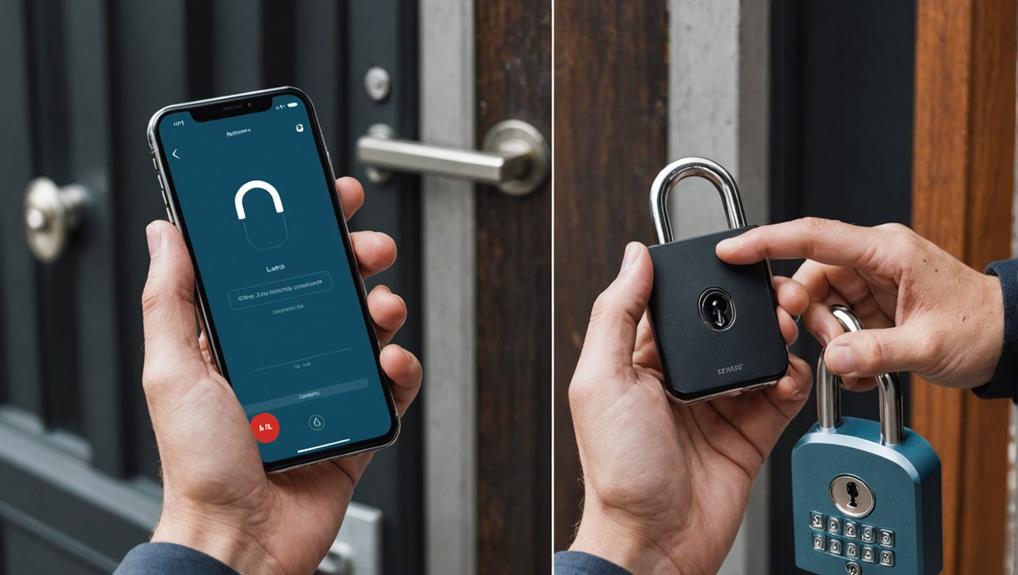
When it comes to convenience, keyless locks typically offer a significant advantage over traditional padlocks. Imagine never having to fumble with keys again, especially when your hands are full or in poor lighting. With keyless options, you can simply enter a code or use your smartphone to open your door, saving you time and hassle.
Furthermore, the ability to manage access remotely enhances user control, making it easy to grant entry from anywhere, as detailed in Smart Locks vs. Traditional (control features of smart locks).
For those who serve others, such as property managers or community leaders, keyless locks can streamline access for multiple users. You can easily share codes or manage access remotely, ensuring that everyone can enter when needed without the worry of lost keys.
This flexibility allows you to focus on your responsibilities rather than the logistics of physical keys.
Additionally, many keyless locks come with features like temporary access codes, so you can grant visitors access for a limited time. This is particularly handy when you have service personnel or guests needing entry while you're away.
In contrast, padlocks require you to carry keys and may limit your ability to provide quick access. Ultimately, keyless locks simplify your life, making it easier for you and those you serve.
Best Use Cases for Padlocks
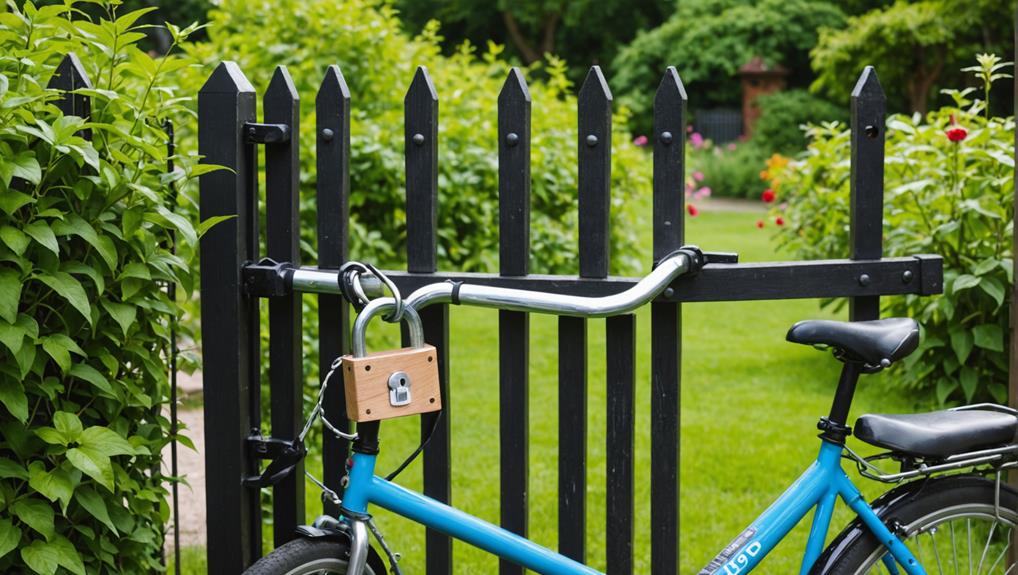
When you're looking for reliable outdoor storage solutions, padlocks can be a great option to keep your belongings safe.
They're particularly effective when paired with sturdy storage units or gates, ensuring a higher level of security for your outdoor valuables.
They also come in handy for temporary locking needs, whether you're renting equipment or securing a storage unit.
Plus, if you're traveling, a sturdy padlock can offer an extra layer of security for your bags or lockers, making it a versatile choice for various situations.
For more information on choosing the right lock types, consider your specific security needs.
Outdoor Storage Solutions
For outdoor storage solutions, padlocks offer a practical and versatile way to secure your belongings. Whether you're storing tools, bikes, or garden equipment, a reliable padlock can provide peace of mind.
Here are four ideal use cases for padlocks in outdoor settings:
- Sheds: Secure your garden tools and equipment from theft or vandalism.
- Gates: Keep your property safe by locking gates leading to driveways or backyards.
- Bikes: Protect your bicycle when you're out and about, ensuring it's safe while you run errands.
- Storage Units: Use a padlock to keep your stored items secure when renting outdoor storage space.
When choosing padlocks, consider features like weather resistance and strength. They're easy to use and require no batteries or codes, making them a reliable choice for everyone.
Plus, if you're serving others, you can help friends and family secure their outdoor spaces as well.
With padlocks, you can confidently protect what matters most, ensuring that your outdoor storage solutions remain safe and secure.
Temporary Locking Needs
Padlocks aren't just great for securing outdoor storage; they also shine in temporary locking situations. If you're hosting an event or gathering, a padlock can be perfect for securing equipment or supplies that you don't want to lose sight of. You can easily lock a storage unit, shed, or even a trailer while you're busy serving your guests, ensuring that everything stays safe and sound.
Another useful scenario is when you need to secure tools or materials at a job site. Padlocks allow you to quickly lock up valuable items when you step away, preventing theft and giving you peace of mind.
If you're a volunteer or part of a community service project, using padlocks can help you safeguard shared resources, ensuring that everyone has access while keeping items secure.
Additionally, if you're working on a short-term project, a padlock can provide a simple and effective way to manage access. Whether it's locking up a gate or securing a temporary structure, you can rely on padlocks to meet your needs without the hassle of complicated keyless systems. Their versatility makes them ideal for any temporary locking situation.
Travel Security Options
Securing your belongings while traveling can feel intimidating, but using padlocks can help ease those worries. They're versatile, reliable, and can serve various purposes to protect your valuables during your journey.
Here are some best use cases for padlocks:
- Luggage Security: Lock your suitcase zippers to deter theft and keep your items safe during transit.
- Lockers: Use padlocks for gym or hostel lockers, ensuring your belongings are secure while you enjoy your activities.
- Bicycles: When exploring a new city, a sturdy padlock can safeguard your bike against theft.
- Storage Units: If you're storing items temporarily while traveling, a padlock on your storage unit adds an extra layer of security.
Choosing the right padlock can empower you to travel with confidence.
While you serve others during your adventures, knowing your belongings are secure allows you to focus on making meaningful connections and enjoying your experiences.
Best Use Cases for Keyless Locks
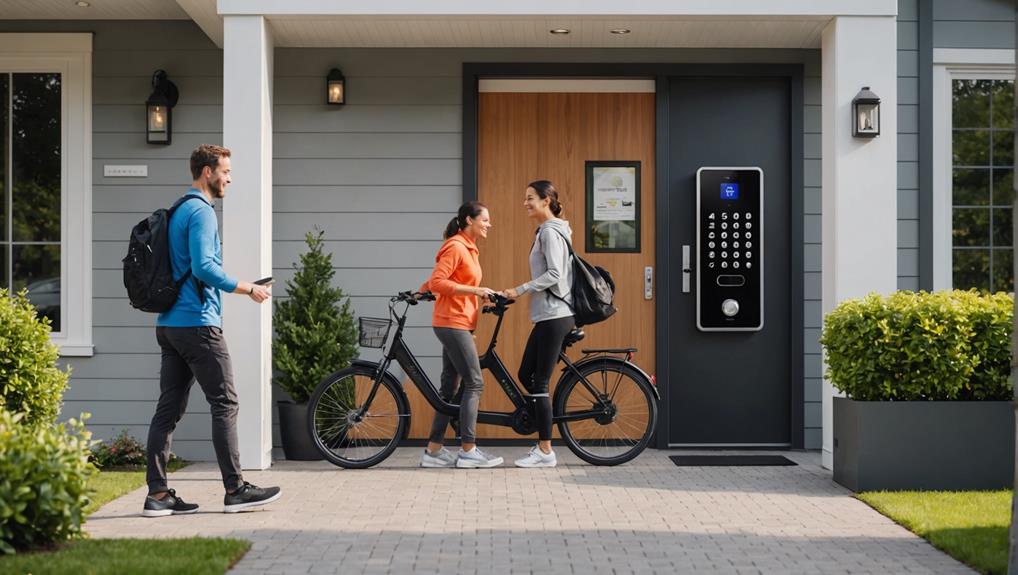
When considering where keyless locks shine, think about convenience and accessibility. These locks are perfect for busy professionals who manage multiple properties or have a team that requires regular access.
Imagine you run a vacation rental; with keyless locks, you can effortlessly grant guests entry without needing to meet them in person. This not only enhances their experience but also allows you to focus on providing excellent service. Additionally, keyless locks eliminate the hassle of re-keying, making it easier to manage access as your needs change re-keying smart locks.
Keyless locks are also great for families. You can give your kids a code to enter when they come home from school, eliminating the need for them to carry a physical key. This adds a layer of safety and peace of mind for parents.
Additionally, consider using keyless locks in community spaces like gyms or coworking offices. You can provide members with unique access codes, ensuring only authorized individuals enter while still maintaining a welcoming environment.
In any scenario where you serve others, keyless locks simplify access management, enhance security, and improve overall efficiency.
Final Thoughts on Selection
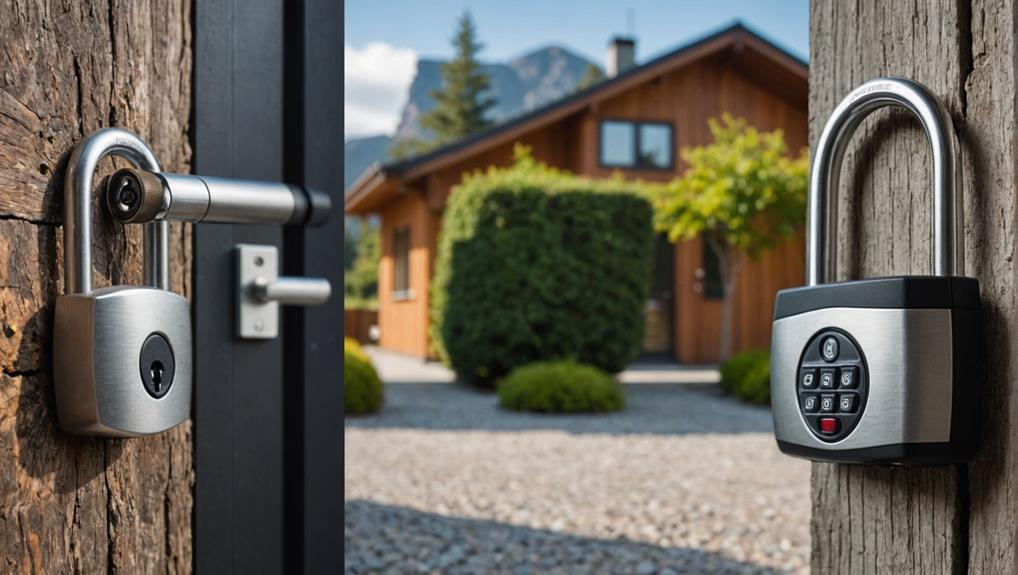
Choosing the right locking system often boils down to your specific needs and lifestyle.
Whether you're looking to enhance security for your family or streamline access for your community service organization, it's important to weigh your options carefully.
One option to evaluate is lock re-keying, which allows you to change the internal mechanism of a lock without replacing the entire unit, offering both convenience and cost savings for frequent changes in access.
Here are four key factors to assess:
- Security Level: Assess the vulnerability of the area you need to secure. Keyless locks often provide advanced security features, while padlocks can be a reliable choice for lower-risk situations.
- Ease of Use: Think about who'll be accessing the lock. Keyless systems can be more convenient, especially for groups, while padlocks might be simpler for occasional use.
- Maintenance: Evaluate how much time you're willing to invest in upkeep. Keyless locks may require battery replacements, while padlocks can be more straightforward.
- Cost: Examine your budget. Padlocks usually offer a lower initial cost, but keyless locks might provide long-term savings through durability and security, particularly when you assess options like lock re-keying to adapt to changing access needs.
Ultimately, the best choice aligns with your values and the needs of those you serve.
Prioritize safety, accessibility, and practicality, and you'll find a locking system that fits perfectly.
Frequently Asked Questions
Can Padlocks Be Easily Picked or Bypassed?
Yes, padlocks can be easily picked or bypassed, especially if they're not high-security models.
If you're using a standard padlock, a determined thief might've the tools and skills to open it quickly.
To enhance security, consider investing in a high-quality padlock with advanced features.
How Do Battery Life and Maintenance Differ Between Lock Types?
When it comes to battery life and maintenance, you'll find keyless locks often require more attention. They rely on batteries, which can die unexpectedly, so regular checks are essential.
On the other hand, padlocks generally need less upkeep; they don't have batteries but might require occasional lubrication.
You'll want to reflect on your lifestyle and how much time you're willing to invest in maintaining your security solution when making a choice.
Are Keyless Locks Vulnerable to Hacking?
Yes, keyless locks can be vulnerable to hacking if not properly secured.
You should make certain your lock uses strong encryption and regularly updates its software. It's wise to use unique access codes and change them frequently.
Additionally, consider enabling two-factor authentication if available.
What Materials Are Best for Padlocks?
When you think of a robust fortress, you picture strong materials standing guard.
For padlocks, hardened steel is your best bet, as it offers excellent resistance against cutting and sawing.
Brass is also a great option, especially for corrosion resistance, while stainless steel combines durability with a sleek finish.
If you want to serve others, ensuring your padlocks are made from these materials can provide peace of mind and security for those you care about.
How Do I Reset a Keyless Lock if I Forget the Code?
If you forget the code for your keyless lock, don't worry! Most locks have a reset feature.
First, locate the reset button, usually inside the battery compartment. Press and hold it until you hear a beep.
Then, enter a new code, following the manufacturer's instructions. Make sure to write it down or store it somewhere safe.
Regularly changing your code can also help keep your lock secure and your mind at ease.
Conclusion
In the epic showdown of padlocks versus keyless locks, it's clear you're not just choosing a lock; you're deciding between old-school charm and futuristic flair! Padlocks might feel like trusty companions from the past, while keyless locks strut their stuff with tech-savvy swagger. Ultimately, it boils down to your style and needs. So, whether you want to wield a key like a knight or swipe your way to security, the choice is yours—make it legendary!

